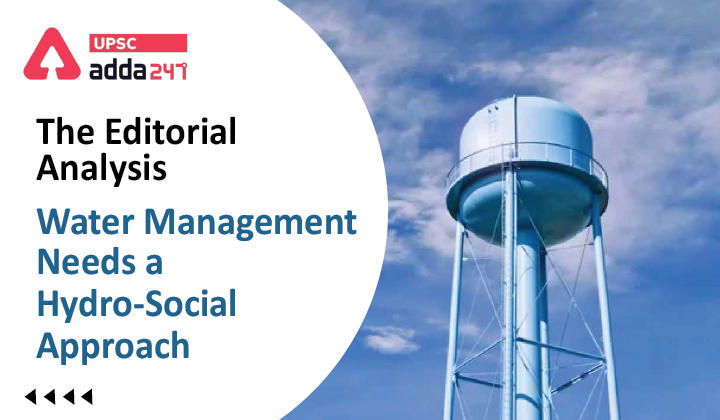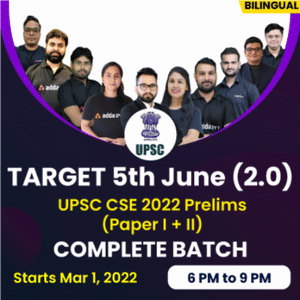Table of Contents
Hydro-Social Approach: Relevance
- GS 3: Conservation, environmental pollution and degradation, environmental impact assessment.
Water crisis in India: Context
- Global Water System Project embodies global concern about the human-induced transformation of fresh water and its impact on the earth system and society.
संपादकीय विश्लेषण: जल प्रबंधन को एक जल-सामाजिक दृष्टिकोण की आवश्यकता है
Depleting freshwater resources in India
- Freshwater resources are under stress due to various human activities.
- If present practice continues, the gap between demand for and supply of fresh water may reach up to 40% by 2030.
- 2030 Water Resource Group in 2008 also recognises this problem and help achieve the SDG 6.
- The latest UN World Water Development Report, 2021, titled ‘Valuing Water’, has laid stress on the proper valuation of water by considering five interrelated perspectives
- water sources;
- water infrastructure;
- water services;
- water as an input to production;
- socio-economic development, and sociocultural values of water.
- In this context, a hydro-social cycle approach provides an appropriate framework.
What is a hydro-social cycle?
- Hydro-social cycle repositions the natural hydrological cycle in a human-nature interactive structure and considers water and society as part of a historical and relational-dialectical process.
Freshwater issues
- Inter-basin transfer projects
- Human intervention has influenced the freshwater systems through irrigation, river channel engineering and land use change, change in aquatic habitat.
- The intra- and inter-basin transfer (IBT) of water is a major hydrological intervention to rectify the imbalance in water availability due to naturally prevailing unequal distribution of water resources within a given territory.
- There are several IBT initiatives across the world.
- The National River Linking Project of India is one of those under construction.
- These projects, if executed, will create artificial water courses that are more than twice the length of the earth’s equator.
- Budget 2022 mentions the Ken Betwa River link project.
- This decision raises larger questions about hydrological assumptions and the use and the management of freshwater resources in the country.
- The agriculture sector uses around 90% of total water use in India. And in industrial plants, consumption is 2 times to 3.5 times higher per unit of production of similar plants in other countries.
- The discharge of untreated grey water and industrial effluents into freshwater bodies is cause for concern.
- It is estimated that 55% to 75% of domestic water use turns into grey water.
- Apart from the inefficient use of water in all sectors, there is also a reduction in natural storage capacity and deterioration in catchment efficiency.
Water crisis in India: Way forward
- It is important to include less predictable variables, revise binary ways of thinking of ‘either or’, and involve non-state actors in decision-making processes.
- A hybrid water management system is necessary that includes individual, community and society with definite roles in the value chain.
- The challenge is not to be techno-centric but anthropogenic.
Read current affairs for UPSC





 TSPSC Group 1 Question Paper 2024, Downl...
TSPSC Group 1 Question Paper 2024, Downl...
 TSPSC Group 1 Answer key 2024 Out, Downl...
TSPSC Group 1 Answer key 2024 Out, Downl...
 UPSC Prelims 2024 Question Paper, Downlo...
UPSC Prelims 2024 Question Paper, Downlo...
